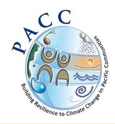The adoption by Nauru of its National Water, Sanitation and Hygiene Policy is a result of the implementation of the Integrated Water Resource Management (IWRM) and the Pacific Adaptation to Climate Change (PACC) projects, which both task Pacific islands to develop National Water Policies as a legal framework to support IWRM and adaptation to climate change.
 13 February 2012: The National Cabinet of Nauru officially adopted the National Water, Sanitation and Hygiene Policy, as a part of the country’s climate change adaptation efforts.
13 February 2012: The National Cabinet of Nauru officially adopted the National Water, Sanitation and Hygiene Policy, as a part of the country’s climate change adaptation efforts.
The adoption of the Policy is a result of the implementation of the Integrated Water Resource Management (IWRM) and the Pacific Adaptation to Climate Change (PACC) projects, which both task Pacific islands to develop National Water Policies as a legal framework to support IWRM and adaptation to climate change. According to Secretariat of the Pacific Regional Environment Programme (SPREP), PACC Nauru focuses on enhancing the adaptive capacity in the Water Management Sector.
The Policy is a collaborative effort between the Commerce, Industry and Environment Division (CIE), Pacific Islands Applied Geosciences Commission (SOPAC) and other national and regional stakeholders.
The IWRM is a GEF project executed by the Pacific Islands Applied Geosciences (SOPAC) in cooperation with 14 Pacific island countries.
The PACC Project consists of 14 member countries and is implemented by the UN Development Programme (UNDP) in partnership with SPREP. It is funded by the Global Environment Facility (GEF) and the Australian Agency for International Development with support from the UN Institute for Training and Research (UNITAR) Climate Change Capacity Development (C3D+) Programme. [SPREP Press Release]